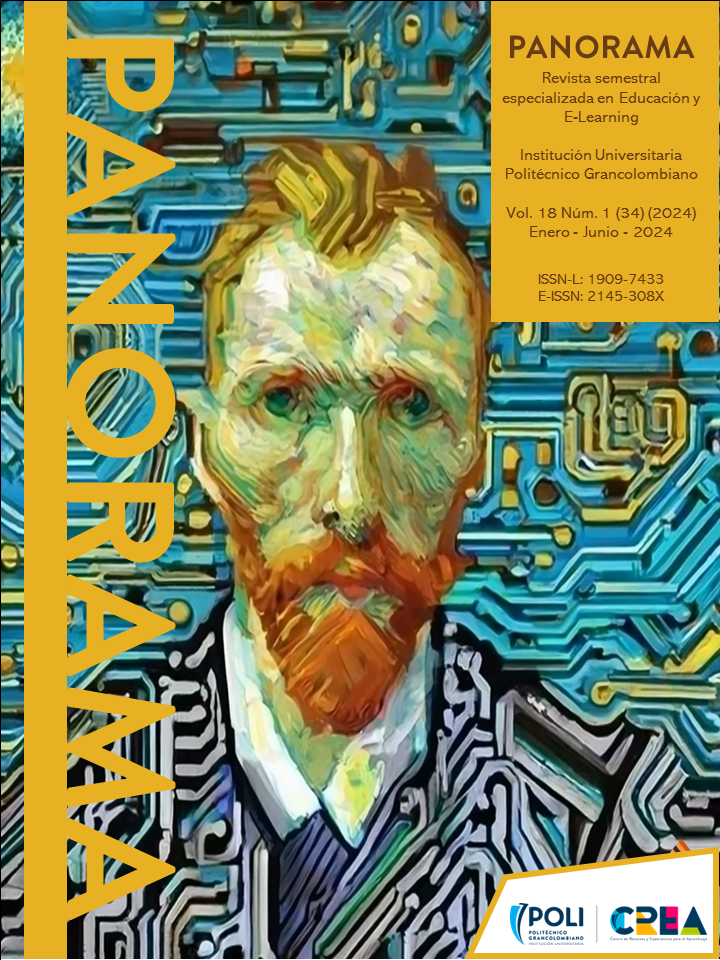Abstract
Artificial intelligence (AI) is invading all areas of our lives, and education is no exception. This increasingly sophisticated technology offers transformative potential to revolutionize traditional teaching and learning methods.
References
Acevedo, E. E. N. (2019). Nuevos lenguajes para aprendizaje virtual herramientas para los escenarios de aprendizaje. Panorama, 13(24), 5–7. https://doi.org/10.15765/PNRM.V13I24.1214
Andreu, J. M. P. (2022). Sistematic review about evaluation of gamification in seven educational disciplines. Teoria de la Educación, 34(1), 189–214. https://doi.org/10.14201/TERI.27153
Apablaza-Campos, A., & Wilches Tinjacá, J. A. (2024). Inteligencia artificial para la generación de contenidos en Iberoamérica. Iniciación Científica. https://doi.org/10.15765/LIBROSIC.V5I60.53
Arias-Velandia, N., Rincón-Báez, W., Rojas-Tolosa, S. M., Moreno-Jiménez, Y. J., & Daza-Orozco, C. E. (2022). Panorama bibliográfico sobre actividades deficiencia, logro de aprendizaje y formación de vocaciones científicas en educación básica y media.
Barroso-Moreno, C., Rayon-Rumayor, L., & García-Vera, A. B. (2023). Big Data and Business Intelligence on Twitter and Instagram for digital inclusion | Big Data y Business Intelligence en Twitter e Instagram para la inclusión digital. Comunicar, 30(74), 45–56. https://doi.org/10.3916/C74-2023-04
Black, D., Bissessar, C., & Boolaky, M. (2019). Online Education as an Opportunity Equalizer: The Changing Canvas of Online Education. Interchange. https://doi.org/10.1007/s10780-019-09358-0
Bliquez, R., & Deeken, L. (2016). Hook, Line and Canvas: Launching a Professional Development Program to Help Librarians Navigate the Still and Stormy Waters of Online Teaching and Learning. Journal of Library and Information Services in Distance Learning, 10(3–4), 101–117. https://doi.org/10.1080/1533290X.2016.1206778
Carroll, A. J., Tchangalova, N., & Harrington, E. G. (2016). Flipping one-shot library instruction: Using Canvas and Pecha Kucha for peer teaching. Journal of the Medical Library Association, 104(2), 125–130. https://doi.org/10.3163/1536-5050.104.2.006
Daza-Orozco, C. E., Luque-Forero, A. C., & Padilla-Murcia, E. (2022). Educación superior: sustentabilidad y prácticas innovadoras. Editorial Politécnico Internacional, 370.
Daza-Orozco, C.E.; Norman-Acevedo, E. (2019). Iniciación Científica Conceptualización, metodologías y buenas prácticas. Institución Universitaria Politécnico Grancolombiano.
Estrada-Araoz, E. G., Manrique-Jaramillo, Y. V., Díaz-Pereira, V. H., Rucoba-Frisancho, J. M., Paredes-Valverde, Y., Quispe-Herrera, R., & Quispe-Paredes, D. R. (2024). Assessment of the level of knowledge on artificial intelligence in a sample of university professors: A descriptive study | Evaluación del nivel de conocimiento sobre inteligencia artificial en una muestra de docentes universitarios: Un estudio descriptiv. Data and Metadata, 3. https://doi.org/10.56294/dm2024285
Flores-Bueno, D., Limaymanta, C. H., & Uribe-Tirado, A. (2021). The gamification in the development of information literacy from the perspective of university students. Revista Interamericana de Bibliotecologia, 44(2). https://doi.org/10.17533/UDEA.RIB.V44N2E342687
García-Peñalvo, F. J., Llorens-Largo, F., & Vidal, J. (2024). The new reality of education in the face of advances in generative artificial intelligence | La nueva realidad de la educación ante los avances de la inteligencia artificial generativa. RIED-Revista Iberoamericana de Educacion a Distancia, 27(1), 9–39. https://doi.org/10.5944/ried.27.1.37716
Jara-Abanto, F., Velasquez-Medina, L., & Meneses-Claudio, B. (2023). Machine learning for the improvement of adaptive learning in university education. Salud, Ciencia y Tecnología - Serie de Conferencias, 2. https://doi.org/10.56294/sctconf2023473
Miranda, R. C. & Ayoub, E. (2016). Circus practices in the “Loom” of initial training in physical education: New textures in addition to the canvas. Movimento, 22(1), 187–198. https://www.scopus.com/inward/record.uri?eid=2-s2.0-84975699552&partnerID=40&md5=8d65cad621d84297d98b02d205b903d5
Norman-Acevedo, E. (2018a). Educación virtual: Una oportunidad para la competividad y el desarrollo. https://journal.poligran.edu.co/index.php/libros/article/view/1749
Norman-Acevedo, E. (2018b). Rompiendo Barreras, 10 Años de la Educación Virtual en el Politécnico Grancolombiano. Institución Universitaria Politécnico Grancolombiano. http://alejandria.poligran.edu.co/handle/10823/1146
Norman-Acevedo, E., Norman-Acevedo, E., & Trujillo-Flórez, L. M. (2023). Rol del tutor 4.0 en el proceso pedagógico, a la luz de una humanidad digital. Panorama, 17(33), 1–8. https://doi.org/10.15765/pnrm.v17i33.4168
Núñez, A., Tala, Á, Astudillo, M., Varela, I., Polit, A., & Badell, J. S. (2024). Machine Learning: A training need today for tomorrow’s physicians | Machine Learning: Una necesidad formativa hoy para los médicos del mañana. Revista Chilena de Anestesia, 53(1), 16–20. https://doi.org/10.25237/revchilanestv53n1-04
Parra-González, M. E., Segura-Robles, A., & Romero-García, C. (2020). Analysis of creative thinking and levels of student activation after a gamification experience. Educar, 56(2), 475–489. https://doi.org/10.5565/REV/EDUCAR.1104
Rojas Berrío, Sandra. Sánchez Torres, Marcel, & Topete Barrera, Carlos. (2014). Modelos de evaluación del desempeño de las actividades científicas. 152.
Wilches-Tinjacá, J. A.; Castiblanco-Roldán, A.; Daza-Orozco, C.E. (2023). Gestos, tecnologías y sociedades: tendencias y emergencias en tiempos de pospandemia. Politécnico Internacional, 1-250.
Wilches-Tinjacá, J. A., López, M. E. S., & Daza-Orozco, C. E. (2022). Todo tiempo pasado (no) fue mejor: educación para el futuro y tecnologías posthumanas en el redimensionamiento de lo público-privado. Politécnico Internacional, 223-245

This work is licensed under a Creative Commons Attribution-NonCommercial-NoDerivatives 4.0 International License.
Copyright (c) 2024 Panorama





